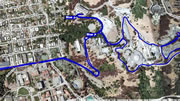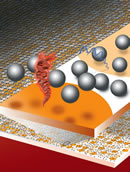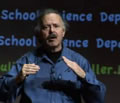


Effective immediately, Lab shuttle riders can take advantage of a new service that uses GPS technology to obtain real-time information on bus arrivals. Using Nextbus service, bus riders can now find out when the next bus is due to arrive at their stop by checking the code which appears on the bus stop signs, by calling, or by going online to www.nextbus.com. Riders can see where the shuttle buses are in real time by clicking on the live map link, or get actual arrival times for a particular stop by clicking on the Arrival Times link. To call Nextbus for Berkeley Lab, dial 510-280-1693 and enter the code for the bus stop. You will automatically get the next two arrival times. Nextbus allows you to take the guesswork out of reducing your carbon footprint.
 Winter Food Drive: Still Time to Donate to Alameda County Food Bank
Winter Food Drive: Still Time to Donate to Alameda County Food BankThanks to all who donated to the Alameda County Food Bank (ACFB) this winter, generously filling three barrels located in the cafeteria lobby. A reminder that the food drive, which was sponsored by the Lab’s Directorate, does not have to end with the holiday season. Staff can still donate directly by visiting the ACFB website. As the county's clearinghouse for donated food, the Food Bank provides food assistance for 40,000 low-income Alameda County residents each week, including 14,000 children and 7,000 seniors. Most adults served are among the working poor. To learn more, visit the site.
 In the News: Building a Cool World, With New Roofs
In the News: Building a Cool World, With New Roofs(greentechmedia) Your roof is an island of heat. Cooling it could reduce billions of tons of carbon dioxide emissions. But how do you make these roofs attractive? Using reflective materials for paving roofs and streets in the world's urban areas could offset 44 billion metric tons of carbon dioxide emissions. That would be akin to taking 600 million cars off the road for 18 years, according to a recently published paper in the journal Climatic Change by researchers at the Lawrence Berkeley National Laboratory. The paper, authored by Hashem Akbari, Surabi Menon and Art Rosenfeld, looked at the impact of using materials especially designed to reflect sunlight and emit heat to reduce building cooling costs and minimize what's called the "heat island effect." More here.
 In the News: Research Could Help End the Problem of Adverse Drug Reactions
In the News: Research Could Help End the Problem of Adverse Drug Reactions(ScientistLive) Recent research is bringing the dream of personalized medicine a step nearer. A team of researchers with the US Department of Energy's Berkeley Lab has invented a technique in which DNA or RNA assays can be read and evaluated without the need of elaborate chemical labeling or sophisticated instrumentation. Based on electrostatic repulsion - in which objects with the same electrical charge repel one another - the technique is relatively simple and inexpensive to implement, and can be carried out in a matter of minutes. "One of the most amazing things about our electrostatic detection method is that it requires nothing more than the naked eye to read out results that currently require chemical labeling and confocal laser scanners," said Jay Groves, a chemist who led this research. "We believe this technique could revolutionize the use of DNA microarrays for both research and diagnostics." Full story.
 Construction Update: Road Repairs Tomorrow Near Building 65
Construction Update: Road Repairs Tomorrow Near Building 65Road repairs will be taking place tomorrow, near Building 65 in the uphill lane area. During this project traffic will be reduced to one lane, using two-way traffic controls with flaggers. Work is expected to continue throughout the day. Use caution in the vicinity.
 Web Resources: 'Science at the Theater' Talks on YouTube
Web Resources: 'Science at the Theater' Talks on YouTubeThe Fall 2008 "Science at the Theater" lectures are available on Berkeley Lab's YouTube channel. Watch theoretical physicist Eric Linder as he delves into the mystery of dark energy. Physicist Richard Muller gives his popular talk, Physics 101: What Our Next President Needs to Know. And Arun Majumdar, director of Berkeley Lab's Environmental Energy Technologies Division, discusses how scientists are creating a new generation of net-zero energy, carbon-neutral buildings. Go here for these and other Science at the Theater lectures. Go here to view the Lab's YouTube channel.